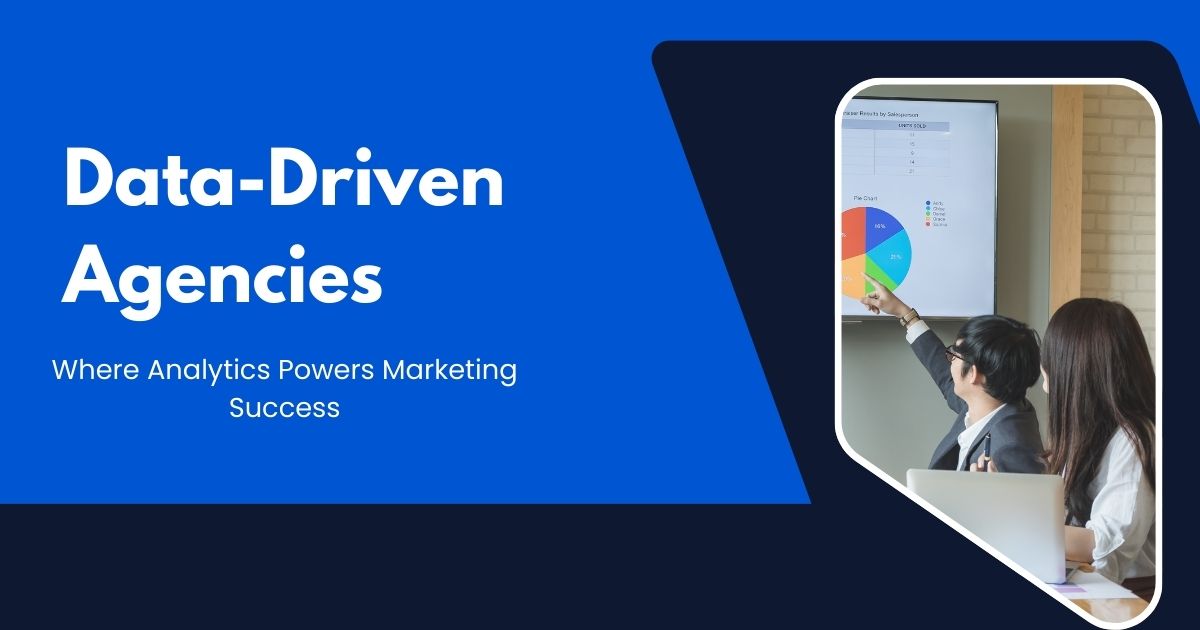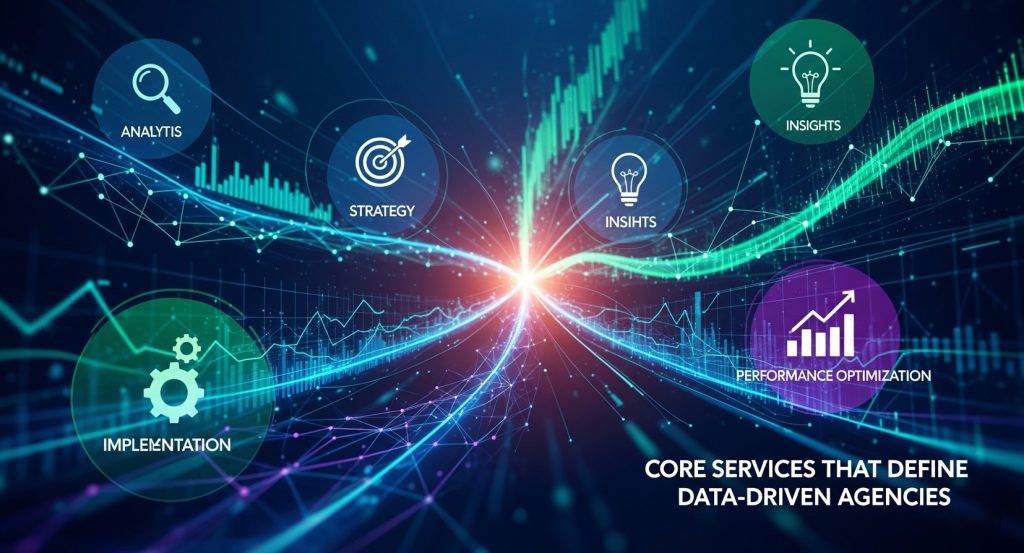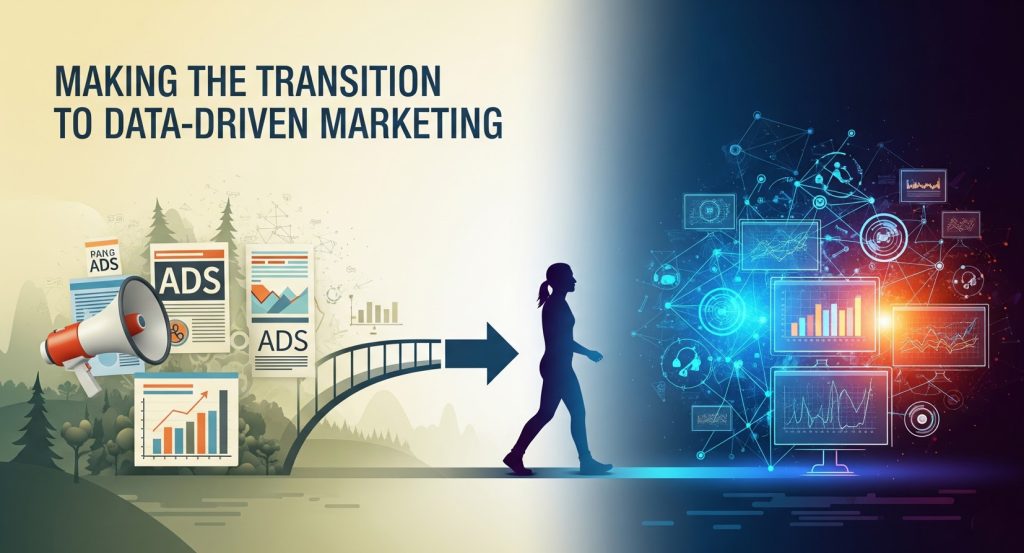
Marketing has evolved beyond creative hunches and gut feelings. While traditional marketing agencies still rely heavily on intuition and broad demographic assumptions, data-driven internet marketing agencies use concrete metrics and analytics to guide every decision. This fundamental difference is reshaping how businesses approach their marketing strategies and delivering measurably better results.
The shift toward data-driven marketing represents more than just a trend—it’s a complete transformation in how successful marketing campaigns are conceived, executed, and optimized. Companies partnering with agencies that prioritize data analysis consistently see higher ROI, better customer acquisition rates, and more sustainable growth than those using traditional approaches.
Understanding what sets data-driven agencies apart can help you make informed decisions about your marketing partnerships and unlock your business’s full growth potential.
What Makes a Marketing Agency Data-Driven?
A data-driven internet marketing agency builds its entire operation around collecting, analyzing, and acting on quantifiable information. These agencies don’t just track basic metrics like website visits or social media followers. They dig deeper into customer behavior patterns, conversion pathways, lifetime value calculations, and attribution models. Learn more about how data marketing analytics works to understand the depth of insights these agencies leverage.
Key Characteristics of Data-Driven Agencies
Advanced Analytics Infrastructure: These agencies invest heavily in sophisticated tracking systems, analytics platforms, and data visualization tools. They can monitor customer interactions across multiple touchpoints and create comprehensive pictures of user journeys.
Hypothesis-Based Testing: Rather than launching campaigns based on assumptions, data-driven agencies formulate specific hypotheses and test them systematically. Every creative element, targeting parameter, and campaign message undergoes rigorous A/B testing.
Real-Time Optimization: Data-driven agencies continuously monitor campaign performance and make adjustments on the fly. They don’t wait for monthly reports to identify problems or opportunities—they respond to data insights as they emerge.
Predictive Modeling: Using historical data and machine learning algorithms, these agencies can forecast future trends, identify high-value prospects, and predict campaign outcomes before significant budget allocation.
The Traditional Agency Approach vs. Data-Driven Methods
Traditional marketing agencies typically operate on experience-based decision making. They create campaigns based on industry best practices, creative inspiration, and general market knowledge. While this approach can produce compelling creative work, it often lacks the precision needed for optimal performance.
Where Traditional Agencies Fall Short
Traditional agencies frequently struggle with accurate attribution. They might know that a campaign generated brand awareness, but they can’t precisely track which specific elements drove actual conversions. This makes optimization difficult and budget allocation inefficient.
Campaign adjustments in traditional agencies often happen quarterly or monthly during scheduled review meetings. By the time underperforming campaigns are identified and modified, significant budget has been wasted and opportunities lost.
The Data-Driven Advantage
Data-driven internet marketing agencies approach every campaign as a series of measurable experiments. They establish clear key performance indicators (KPIs) before launch, implement comprehensive tracking systems, and continuously optimize based on real-time feedback.
These agencies can tell you exactly which ad variations perform best with specific audience segments, which content types drive the most qualified leads, and which marketing channels provide the highest return on investment. This granular insight enables precise budget allocation and strategic refinement.
Core Services That Define Data-Driven Agencies

Advanced Customer Analytics
Data-driven agencies excel at customer segmentation and persona development based on actual behavior rather than assumptions. They analyze purchase patterns, engagement metrics, and demographic data to create highly targeted marketing strategies.
These agencies build comprehensive customer lifetime value models, helping clients understand not just acquisition costs but the long-term revenue potential of different customer segments. This insight drives more strategic decision making about marketing spend and customer retention efforts.
Performance Marketing and Attribution
Multi-touch attribution modeling is a hallmark of data-driven marketing agencies. They track customer interactions across all channels—from initial awareness through final conversion—providing clear visibility into which marketing efforts truly drive results.
This detailed attribution data enables precise budget optimization. Instead of spreading marketing spend evenly across channels, these agencies can identify the highest-performing touchpoints and allocate resources accordingly.
Conversion Rate Optimization (CRO)
Data-driven agencies treat websites and landing pages as ongoing experiments rather than static assets. They systematically test different layouts, copy variations, call-to-action buttons, and user flows to maximize conversion rates.
Using heat mapping tools, user session recordings, and detailed analytics, these agencies identify exactly where potential customers drop off in the conversion process and implement targeted solutions to address these issues.
Marketing Automation and Personalization
Leveraging customer data and behavioral triggers, data-driven agencies create sophisticated automation workflows that deliver personalized experiences at scale. Advanced personalization goes beyond simply inserting a customer’s name into an email. They create dynamic content that adapts based on user preferences, purchase history, browsing behavior, and demographic characteristics. Check out how data-driven email marketing grows through analytics.
Advanced personalization goes beyond simply inserting a customer’s name into an email. Data-driven agencies create dynamic content that adapts based on user preferences, purchase history, browsing behavior, and demographic characteristics.
Measuring Success: KPIs That Matter
Revenue-Based Metrics
While traditional agencies might focus on vanity metrics like impressions or social media likes, data-driven agencies prioritize metrics directly tied to business outcomes. They track customer acquisition cost (CAC), lifetime value (LTV), return on ad spend (ROAS), and overall marketing-generated revenue.
These agencies understand that marketing’s ultimate purpose is driving profitable growth, not just generating awareness or engagement. Every campaign is evaluated based on its contribution to the bottom line.
Attribution and Customer Journey Analysis
Data-driven agencies provide detailed visibility into the customer journey, showing exactly how prospects interact with different marketing touchpoints before converting. This analysis reveals which channels and campaigns deserve credit for conversions, enabling more accurate performance evaluation.
Advanced attribution modeling helps identify assist channels that might not directly generate conversions but play crucial roles in the customer journey. This insight prevents successful supporting channels from being incorrectly labeled as underperformers.
Predictive Performance Indicators
Forward-looking agencies don’t just report on past performance—they use predictive analytics to forecast future outcomes. They can identify early warning signs of campaign fatigue, predict seasonal trends, and estimate the long-term impact of marketing investments.
This predictive capability enables proactive optimization rather than reactive problem-solving, helping clients stay ahead of market changes and competitive pressures.
Choosing the Right Data-Driven Partner

Technology Stack Assessment
When evaluating potential agency partners, examine their technology capabilities. Leading data-driven agencies invest in premium analytics platforms, marketing automation tools, and data visualization software. They should be able to demonstrate their technical infrastructure and explain how they use it to drive results.
Ask potential partners about their data integration capabilities. Can they connect your CRM data with advertising platforms? Do they have systems in place to track offline conversions? These technical capabilities directly impact their ability to provide comprehensive insights.
Team Expertise and Certifications
Data-driven agencies employ specialists in analytics, data science, and marketing technology alongside traditional marketing professionals. Look for teams with relevant certifications in platforms like Google Analytics, Facebook Business Manager, and marketing automation tools.
The best agencies combine technical expertise with strategic marketing knowledge. They understand both the mechanics of data analysis and the broader implications for business growth.
Reporting and Communication Standards
Effective data-driven agencies provide regular, detailed reports that translate complex analytics into actionable insights. They should offer real-time dashboard access and scheduled reporting that aligns with your business review cycles.
Beyond basic performance reporting, these agencies should provide strategic recommendations based on their data analysis. They act as consultative partners, using insights to guide future marketing decisions rather than simply reporting what happened.
Making the Transition to Data-Driven Marketing

Setting Expectations and Goals
Successfully working with a data-driven internet marketing agency requires clear goal setting and performance expectations. These agencies excel when given specific, measurable objectives like increasing qualified leads by 40% or reducing customer acquisition costs by 25%.
Establish baseline metrics before beginning any partnership. Data-driven agencies need historical performance data to benchmark improvements and demonstrate their impact on your business results.
Data Infrastructure Preparation
Before partnering with a data-driven agency, ensure your business has adequate tracking systems in place. This includes properly configured analytics platforms, CRM integration, and conversion tracking setup. Many agencies can help with this technical setup, but having basic systems ready accelerates the optimization process.
Consider data quality and accessibility. The insights generated by data-driven agencies are only as good as the underlying data quality. Invest in cleaning up customer databases and establishing consistent data collection practices.
Data Governance and Ethical Marketing Practices
With great data power comes great responsibility. Data-driven marketing agencies must prioritize data governance and ethical marketing practices to maintain trust with their clients and end users.
Agencies implement strict data management protocols to ensure accuracy, privacy, and compliance with regulations such as GDPR, CCPA, and other local data protection laws. This includes proper consent management, secure storage of sensitive customer data, and transparent reporting practices.
Ethical marketing also extends to avoiding manipulative practices that exploit data. Instead, the focus is on delivering value-driven marketing that respects customer preferences while achieving business objectives. Companies that partner with agencies upholding strong ethical standards are more likely to maintain customer trust and avoid costly reputational risks.
Continuous Learning and Adaptation: The Data-Driven Mindset
A core trait of successful data-driven agencies is the commitment to continuous learning and adaptation. In the fast-changing digital landscape, what works today may not be effective tomorrow. These agencies continually analyze results, test new strategies, and refine campaigns based on emerging trends.
They also invest in employee training and development, ensuring their teams stay current on analytics tools, marketing technologies, and industry best practices. By fostering a culture of learning, data-driven agencies can anticipate market shifts, respond to competitive pressures, and consistently deliver superior results for their clients.
The Future of Marketing Lies in Data
Data-driven marketing agencies represent the future of digital marketing. As privacy regulations evolve and third-party cookies disappear, agencies with strong first-party data capabilities and advanced analytics will have significant competitive advantages.
Businesses that partner with data-driven agencies position themselves for sustained growth through economic cycles and market changes. The insights generated by these partnerships compound over time, creating increasingly effective marketing strategies and better business outcomes.
The choice between traditional and data-driven marketing approaches isn’t just about campaign performance—it’s about building a marketing foundation that scales with your business and adapts to changing market conditions. Companies ready to embrace this analytical approach will find themselves ahead of competitors still relying on outdated methods.
Frequently Asked Questions (FAQ)
What is a data-driven internet marketing agency?
A data-driven internet marketing agency prioritizes metrics, analytics, and measurable insights over intuition. They collect and analyze data from multiple channels to optimize campaigns, increase ROI, and provide strategic recommendations backed by evidence.
How do data-driven agencies measure success?
They focus on performance metrics tied to business outcomes, such as customer acquisition cost (CAC), lifetime value (LTV), return on ad spend (ROAS), and conversion rates. They also track multi-channel attribution to understand the full impact of campaigns.
Do I need to provide my data to the agency?
Yes, agencies need access to your historical and current data to analyze performance accurately. This includes website analytics, CRM records, sales data, and any other relevant marketing metrics. Strong data governance ensures your information remains secure.
Can small businesses benefit from data-driven marketing agencies?
Absolutely. Even small businesses can leverage data-driven insights to optimize their campaigns, allocate marketing budgets efficiently, and improve customer targeting. Many agencies offer scalable solutions suitable for smaller operations.
How quickly can I see results from a data-driven agency?
While some quick wins may appear in the first few weeks, meaningful improvements often take 3–6 months as campaigns are tested, optimized, and refined based on collected data. The long-term benefits compound over time.
Are data-driven agencies more expensive than traditional agencies?
They may have higher upfront costs due to advanced tools and analytics infrastructure. However, the improved ROI, efficient budget allocation, and long-term growth potential often justify the investment.
How do data-driven agencies handle privacy and compliance?
They implement strict data governance protocols, secure storage, consent management, and adherence to GDPR, CCPA, and other regulations to ensure data is handled responsibly and ethically.
What industries benefit most from data-driven marketing?
Virtually any industry can benefit, but sectors like e-commerce, SaaS, finance, healthcare, and B2B services see especially strong results due to their reliance on measurable customer interactions and data-driven decision-making.
Leave a Reply